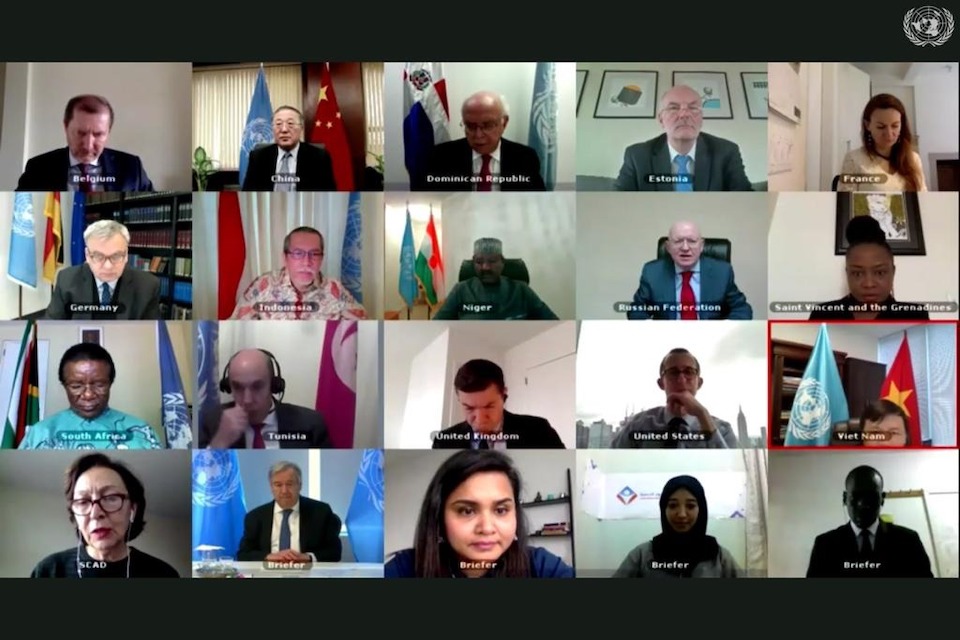Youth, Peace and Security
Statement by Ambassador James Roscoe, UK Acting Deputy Permanent Representative to the UN, at the Security Council Open Debate on Maintenance of International Peace and Security: Youth, Peace and Security

Thank you, Mr President. Thank you again to you for calling this open debate today and we’re also very grateful to the Secretary-General and the Youth Envoy and our other briefers. We’re also particularly glad to hear those perspectives from the youth briefers. There was a lot to reflect on there in terms of putting youth and the peace and security agenda into a broader and more personal context. Thank you very much to them.
Mr President, I wanted to focus on on three points today. Firstly, on, as others have done, the impact of COVID-19 on youth and on this agenda. And secondly, on the critical role of education. And thirdly, on the importance of protecting young human rights defenders and young peace builders.
Allow me to begin with a quick word on COVID-19. I think we all know the world is experiencing an unprecedented challenge in the face of this global pandemic. And it’s clear that we can only defeat COVID if we work together to defeat it everywhere. And this requires global effort. But young people are going to be key to the global response to this pandemic, and that’s going to mean listening to them and ensuring their needs are taken into account, that they are involved in decisions about our handling of this crisis as it affects their lives.
As others have noted, more than half of the world’s population is below the age of 30 and they will be hard hit by the second order effects of this virus. They will experience the uncertainty and hardship of the global economic slowdown and the social disruption and, in some places, the humanitarian and conflict impacts if we don’t respond quickly to the challenges that COVID will mean for vulnerable societies. So we need youth to join our efforts to fight the virus and we need to ensure that they do not bear the brunt of its impact.
Mr President, the second point I wanted to talk to was about education, and it was really striking in Gatwal’s story to hear of how the point at which his life pivoted really from being trapped in the cycle of violence that had trapped his father, was when he was in Uganda and was getting an education there. It’s clear that shortcomings in education is not a new phenomenon in many parts of the world, but it’s clear that the pandemic is having a profound impact on education systems, too, with over 1.5 billion children and youth out of school. And more disruption will follow as the virus spreads. It’s important to note that missing out on an education is a huge waste of young people’s potential, but more importantly, it makes societies in which they live less safe and less prosperous because, as Gatwal said, it was an education that gave him hope and prospects. And it is without education that young people, without hope and prospects turn to alternatives including violence.
We also know, Mr President, that school closures have a disproportionate impact on girls’ lives, with girls facing increased risks of child marriage, of teenage pregnancy and gender-based violence and sexual exploitation and being at a risk of dropping out of school permanently. So it’s critical that, where we can, we get schools open as quickly as possible.
It’s also worth noting that it’s not just COVID that’s closing down schools. As we’ve heard in the Council over the last several months, in the Sahel, increased violence has closed hundreds of schools and pushed children out of education again with a knock-on effect on the conflict there.
Mr President, the UK is committed to standing up for the right of every girl to have twelve years of quality education. And we’ve consistently provided funding to deliver on this promise and we’ll continue to do so. In fact, we’ve added an additional $6 million to the Education Cannot Wait programme to provide education the world’s most vulnerable children and youth, particularly as they are affected by the impact of COVID-19.
Mr President, finally, my third point is that young people have to have the freedom and rights to champion what they believe in. We’ve been gravely concerned by reprisals against young human rights defenders and peace builders. Young people face attacks and threats and restrictions on their freedom in attempts to stop them from doing their critical work – including, sadly, here at the UN. Young women are at particular risk, whether age and gender can work against them. That’s why in February this year we co-hosted an Arria meeting on reprisals against women human rights defenders and women peace builders who briefed the Security Council, and many of whom were young. We believe the Council must work together to foster an enabling environment for young people working on peace and security.
Mr President, the South African Ambassador reminded us earlier that today is South Africa’s Freedom Day. And it’s impossible really to imagine South Africa winning that freedom without the energy and the mobilisation of its youth and that youth paid a high price for that freedom, from the Soweto uprisings in 1976, right through the violence that was inspired in the lead-up to democratic elections. And I think as we reflect on that, our job here becomes clear, and that is to ensure a voice for the youth of the world that allows them to become central to the way we govern ourselves and the way we decide on the future, but one that does not come at such a great cost.
Thank you very much, Mr President.